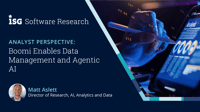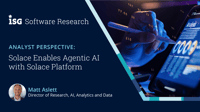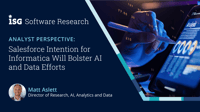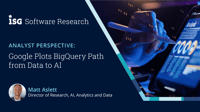One of the key questions that will need to be solved if agentic artificial intelligence is to fulfill its potential is which technologies and providers will serve the role of orchestrating communication and integration between the various models, applications and data repositories involved. ISG Research defines agentic AI as software designed to execute business processes through autonomous actions, potentially controlling multiple processes and systems through the orchestration of one or more...
Read More
Topics:
Governance,
Operations,
AI,
Generative AI,
Data Intelligence,
AI & Technologies,
AI and Machine Learning
My colleagues have recently described how agentic artificial intelligence (AI) has the potential to revolutionize enterprise computing by automating the handling of static and dynamic complexity to enable software to take action without the need for human intervention. Put simply, agentic AI is the orchestration of the execution of discreet business tasks by a combination of software components that automate business processes. While agentic AI is the next big thing, it can also be seen as the...
Read More
Topics:
Governance,
AI,
Generative AI,
AI & Technologies,
AI and Machine Learning,
Streaming & Events
I have previously explained how increased enterprise focus on artificial intelligence (AI) and agentic AI is a forcing function for enterprises to take long-overdue steps to improve data management and data governance. Data is integral to AI: large volumes of data are required to train models, while data freshness is important for inferencing in interactive applications and data quality is fundamental to ensuring that the output of agentic and generative AI (GenAI) initiatives can be relied...
Read More
Topics:
Governance,
Data Management,
Generative AI,
AI & Technologies,
Agentic AI
A little under a year ago, I explained how Google was positioning its BigQuery product as a unified data platform for processing data in multiple formats, across multiple locations, for multiple use cases—including business intelligence (BI) and artificial intelligence (AI)—using a combination of multiple data engines, including SQL, Spark and Python. The evolution of BigQuery as the focus of Google’s analytics and AI offerings continued at the recent Google Cloud Next ‘25 event, with Google...
Read More
Topics:
Data Platforms,
Generative AI,
AI & Technologies
I recently described how business data catalogs are evolving into data intelligence catalogs. These catalogs combine technical and business metadata and data governance capabilities with knowledge graph functionality to deliver a holistic, business-level view of data production and consumption. The concept of the knowledge graph has been part of the data sector for decades, but adoption has typically been limited to industries and enterprises focused on the Semantic Web, such as media,...
Read More
Topics:
Governance,
Data Governance,
Generative AI,
Data Intelligence,
AI & Technologies
Domo is best known as a business intelligence (BI) and analytics software provider, thanks to its functionality for visualization, reporting, data science and embedded analytics. Additionally, as I recently explained, the company’s platform addresses a broad range of capabilities that includes data governance and security, data integration and application development, as well as the automation and incorporation of artificial intelligence (AI) and machine learning (ML) models into BI and...
Read More
Topics:
Analytics,
AI,
Generative AI,
Technologies
It has been a little over a decade since the term data operations entered the analytics and data lexicon. It describes the application of agile development, DevOps and lean manufacturing by data engineering professionals in support of data production. DataOps was initially seen as antithetical to traditional data management approaches, which typically included batch-based and manual tools and practices. The term was embraced by emerging software providers as a means of differentiating from...
Read More
Topics:
Governance,
Machine Learning,
Operations,
Generative AI,
Data Intelligence
Natural language interfaces for business intelligence products existed long before the emergence of generative artificial intelligence. Large language models have allowed BI providers to accelerate the delivery of functionality to convert natural language questions into analytic queries and generate summarizations and recommendations from data and charts. Features that enable natural language query and natural language generation are now ubiquitous.
Read More
Topics:
Analytics,
AI,
Generative AI
Increased enterprise focus on artificial intelligence (AI) and generative AI (GenAI) has served to sharpen the focus on the need for trusted data and reliable analytics and data operations. The ISG State of Generative AI Market Report highlighted that elevated expectations and demands associated with AI are a forcing function for enterprises to take long-overdue steps to improve data and analytics processes to ensure that data that is clean, well-organized and compliant with regulatory...
Read More
Topics:
Analytics,
AI,
data operations,
Generative AI,
Machine Learning Operations,
Analytics and Data,
AI and Machine Learning
As enterprises seek to expand and accelerate the adoption of artificial intelligence (AI) many are finding that longstanding analytics and data challenges are a barrier to success. As was explained in ISG’s State of Generative AI Market Report, AI requires data that is clean, well-organized and compliant with regulatory standards. The need for good data management is by no means new, but the expectations and demands associated with AI are a forcing function for enterprises to take long-overdue...
Read More
Topics:
Machine Learning,
Analytics,
Data,
Artificial intelligence,
natural language processing,
Generative AI,
Data Intelligence,
Machine Learning Operations




















